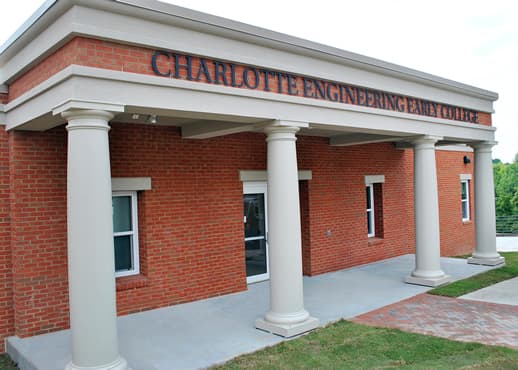Classes to begin at Charlotte Engineering Early College

Classes get under way Monday, Aug. 25, at the new Charlotte Engineering Early College, located in the shadow of EPIC. It is the first of its kind for Charlotte-Mecklenburg Schools (CMS).
The inaugural class of 100 ninth-graders from across Mecklenburg County will delve into a curriculum that focuses on STEM (science, technology, engineering and math) courses, with a special emphasis on energy and engineering. A new school building was constructed near CRI Deck 1 for this collaboration between CMS and UNC Charlotte.
The young students who comprise the first class at Charlotte Engineering Early College will spend three years on high school courses followed by two more years of college course work at no charge.
Program leaders envision the school as a blueprint for the future of STEM education in the region, state and perhaps even the nation. High on the list of goals is to discover ways to bring in more female students, minorities and first-generation college students.
 “When I talk to people about starting this new school, I equate it to the creation of a football program at UNC Charlotte,” said Michele Howard, former dean of students at UNC Charlotte and the director of the Early College Program. “I also was involved in that initiative. I remember when we started on football; we didn’t have a ball, a coach or a field. When we started this, we did not have a desk or a principal or a school building.
“When I talk to people about starting this new school, I equate it to the creation of a football program at UNC Charlotte,” said Michele Howard, former dean of students at UNC Charlotte and the director of the Early College Program. “I also was involved in that initiative. I remember when we started on football; we didn’t have a ball, a coach or a field. When we started this, we did not have a desk or a principal or a school building.
“It’s a big task to create something that did not exist before,” she said. “It really does take a village to build it. We have had incredible support from both the UNC Charlotte administration, starting with Chancellor Phil Dubois on down. And CMS has been very helpful and involved every step of the way.”
Principal Will Leach said interest has been incredibly high among students and parents across the school district. There is currently a waiting list totaling nearly 190 students.
“They were selected by the CMS magnet lottery, and while there are some very bright students, it is not an academically gifted program,” said Leach. “A fairly large number of our first class of students comes from within 10 miles of the UNC Charlotte campus, but there are students from as far away as south Charlotte and Huntersville. They are coming from all over the district.”
Leach, who earned his Master of School Administration from UNC Charlotte in 2000, came from Butler High School, where he oversaw the education of nearly 1,200 students.
“Eventually we will have 500 students and by their fifth year they will be enrolled in only college-level courses,” he said. “Students will earn 24 (high school) credits and 60 or more college-level credits that can be transferred to the college they decide to attend, whether it be UNC Charlotte or somewhere else.
Both Howard and Leach acknowledge that some of the students will require some tutoring and other academic support to get up to the level of the academic challenges they will face in the school.
“That’s the joy of being able to work with them in a smaller setting,” Leach said. “Here we will be able to get to know each student personally.”
Classes at Charlotte Engineering Early College will run from 9:15 a.m. to 4:15 p.m., which is about two hours later than most high schools. Lunches will be brought in from a nearby school. For the first three years, all class time will be spent in the CMS building. The students will be given tours of the 1,000-acre UNC Charlotte campus, and they will be encouraged to attend events on campus to help acquaint them to the college culture they will be immersed in starting in their third year.
Extracurricular activities also will be different at the new high school. While students are entitled to play sports or take part in other extracurricular at their neighborhood school, many of them will have to forgo it because of the later dismissal time. The school’s nickname – the Miners – and colors – green and white – reflect the tight affiliation to the UNC Charlotte 49ers.
The new school will benefit potential employers, who are eager to see a stream of graduates who have strong engineering skills and who can move easily into college programs.
“We are very cognizant of the STEM connection, but everyone wants it to be known that this is an engineering program,” Howard said. “Looking back, the real impetus for this idea came from industry, including major players like Duke Energy and other industry partners.”